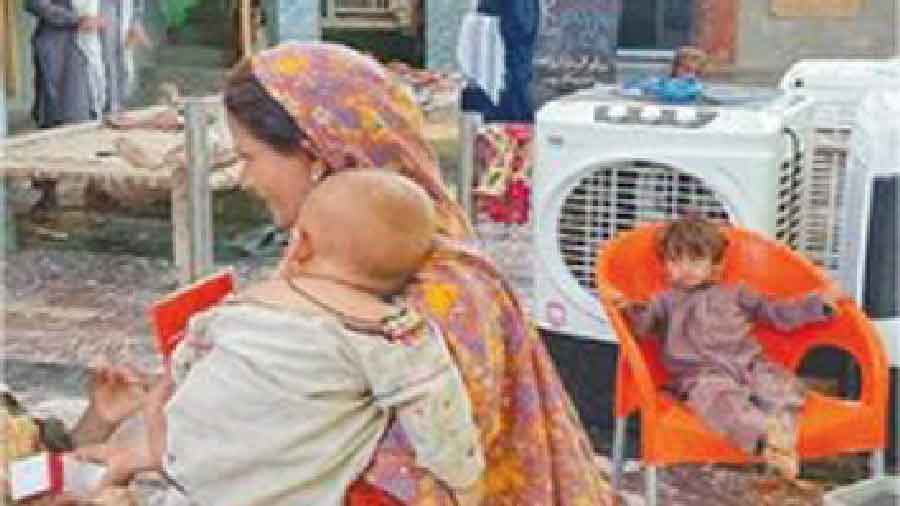
At least 200-300 people, mostly Muslims given refuge
11 Sept 2022
Comment
Hindu temple draws on age-old tradition to help flood-stricken people in Pakistan
Baba Madhodas after whom temple was named, was a pre-partition Hindu saint equally cherished by Muslims and Hindus
 |
| The worship place frequented by Hindu worshippers from across Balochistan is made of concrete and covers a large area: dawn.com |
Perched on high ground, the Baba Madhodas Mandir in Jalal Khan village in the Kachhi district has remained relatively safe from the floodwaters and serves as a sanctuary to the flood-affected people in their bleakest hours.
The village was cut off from the rest of the province due to inundation in the Nari, Bolan, and Lehri rivers, leaving the residents of the remote area to fend for themselves. The local Hindu community opened the doors of the Baba Madhodas Mandir to the flood-hit people and their livestock, the Dawn newspaper reported.
According to locals, Baba Madhodas was a pre-partition Hindu saint equally cherished by Muslims and Hindus of the area.
He used to travel on a camel, says Iltaf Buzdar, a frequent visitor to the village from Bhag Nari tehsil.
Buzdar says as per the stories narrated by his parents, the saint transcended religious boundaries.
He would think of people through the prism of humanity instead of their caste and creed, he said his parents told him.
The worship place frequented by Hindu worshippers from across Balochistan is made of concrete and covers a large area. Since it is located on high ground, it remained relatively safe from the floodwaters.
Most members of the Hindu community in Jalal Khan have migrated to other cities of Kachhi for employment and other opportunities, but a couple of families remain on the temple premises to look after it, the report said.
Rattan Kumar, 55, a shopkeeper in the Bhag Nari tehsil, is in charge of the temple at present.
There are over one hundred rooms in the temple as a large number of people from all over Balochistan and Sindh come here for pilgrimage every year, the report quoted him as saying.
Sawan Kumar, Rattan's son, said a few rooms were damaged by floods, but, overall, the structure remained safe.
At least 200-300 people, mostly Muslims, and their livestock were given refuge on the premises and looked after by Hindu families, the report said.
Initially, the area was completely cut off from the rest of the district. The displaced said they were provided rations via helicopter sorties, but after they moved inside the temple, they were being fed by the Hindu community.
Besides locals, Hindus have also housed the goats and sheep along with other animals, said Israr Mugheri, a doctor in Jalal Khan who has set up a medical camp inside the temple.
There were announcements on the loudspeaker by the local Hindus, calling upon Muslims to rush to the temple to take refuge, he adds.
Those who took refuge there say they are indebted to the local community for coming to their aid and providing them food and shelter during this difficult hour.
For locals, opening the temple to the survivors of the flood was a gesture of humanity and religious harmony, which has been their tradition for centuries, the report said.
Nearly 1,400 people have died in flooding that has inundated a third of the country, wiped-out crops and displaced more than 33 million.
UN chief Antonio Guterres on Saturday exhorted the international community to step up efforts to help flood-ravaged Pakistan rebuild resilient communities and infrastructure to resist future disasters.
Last week, the UN launched an appeal for USD 160 million in aid for Pakistan. Separately, the US has also announced an additional USD 20 million as financial aid for flood relief.

0 Response to "At least 200-300 people, mostly Muslims given refuge"
Post a Comment
Disclaimer Note:
The views expressed in the articles published here are solely those of the author and do not necessarily reflect the official policy, position, or perspective of Kalimpong News or KalimNews. Kalimpong News and KalimNews disclaim all liability for the published or posted articles, news, and information and assume no responsibility for the accuracy or validity of the content.
Kalimpong News is a non-profit online news platform managed by KalimNews and operated under the Kalimpong Press Club.
Comment Policy:
We encourage respectful and constructive discussions. Please ensure decency while commenting and register with your email ID to participate.
Note: only a member of this blog may post a comment.